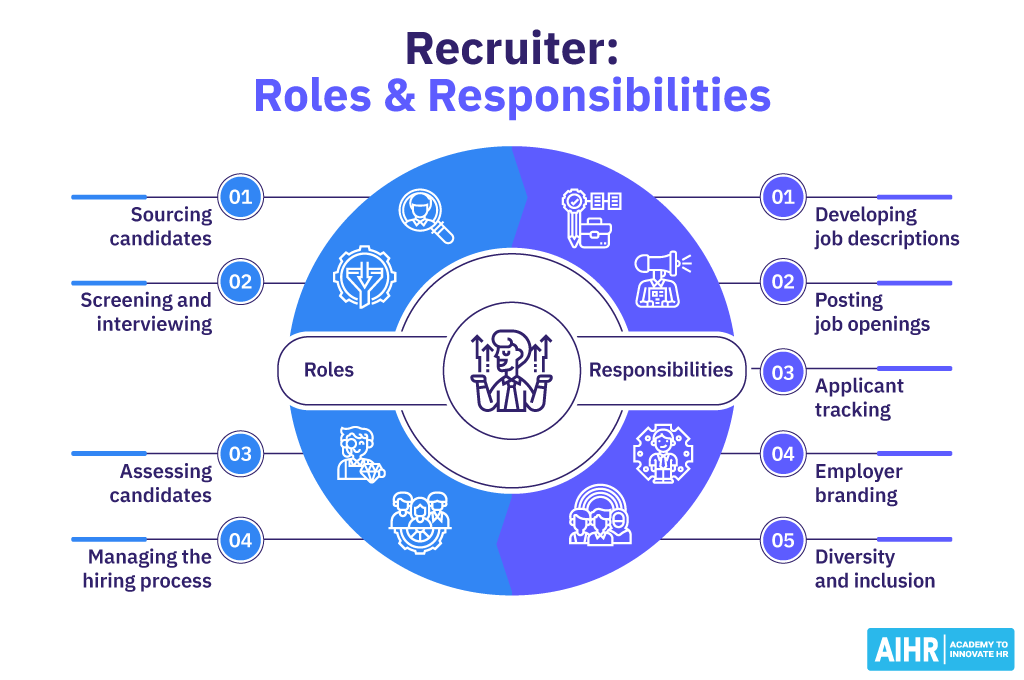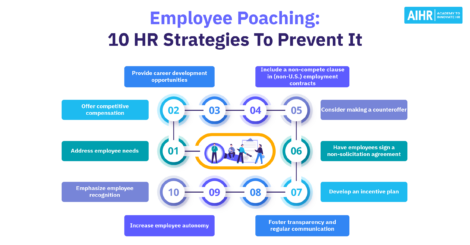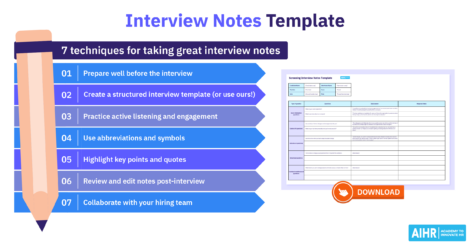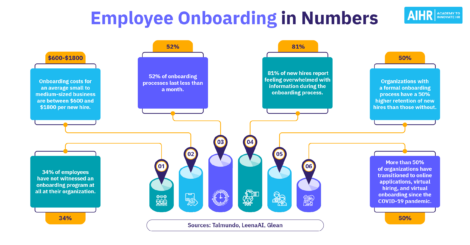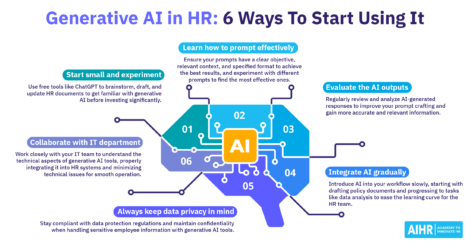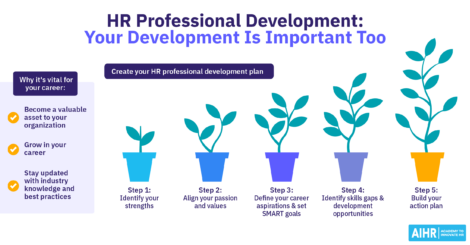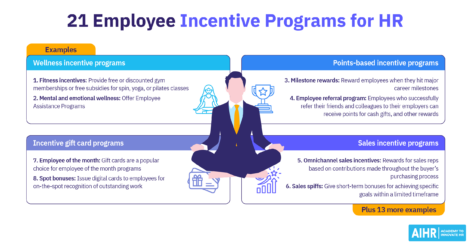How To Write an Effective Recruiter Job Description: The Ultimate Guide

If you’re looking to hire a recruiter for your HR team, you may be wondering what to include in the recruiter job description. Writing a targeted and effective job posting is an important step when recruiting for any position, but it’s especially essential when hiring recruiters. A strong and comprehensive job description can help you attract qualified candidates with the knowledge and skills needed to excel in this vital role.
This article will explain how to write an effective recruiter job description, including tips on what information to include and detailed examples of successful postings from different organizations.
Contents
What is a recruiter?
What do recruiters do?
Required qualifications and experience for a recruiter role
Key responsibilities of a recruiter
Types of recruiter positions
Recruiter job description sample
Recruiter job description examples
Career prospects for recruiters
What is a recruiter?
Recruiters are tasked to source and select qualified candidates, achieve hiring targets, and contribute to the company’s talent acquisition strategy. They are responsible for ensuring:
- Filling open positions in a timely manner
- Selecting and hiring candidates who are considered a good fit for the role
- Attracting a diverse pool of candidates
- Creating a positive candidate experience
- Helping minimize recruitment costs
- Following legal and ethical standards in recruitment
Recruiters are part of the HR team, and their role depends on the size and structure of the organization. They usually report directly to the Senior Recruiter, Recruitment Manager, or HR Manager, depending on the different levels of seniority or specialization among recruiters. They also collaborate with HR Business Partners to ensure alignment in recruitment strategies.
According to McKinsey, the talent war remains fierce. The voluntary quit rate is 25% higher than pre-pandemic levels. With the pace of hiring, quitting, and job creation, openings likely won’t return to normal for some time. And as more employees are keen on exploring new job opportunities or switching careers, recruiters are instrumental in sourcing and attracting top talent to meet the staffing requirements of an organization.
What do recruiters do?
The role of recruiters is critical in identifying and securing the right talent for organizations. They contribute to the organization’s success by hiring candidates with the skills, experience, and cultural fit necessary to thrive within the company.
Here are some of their key roles:
- Sourcing candidates: Recruiters go above and beyond job postings and social media to find the right candidates. They attend job fairs, networking events, and collaborate with specialized staffing agencies to locate top talent, especially in competitive industries.
- Screening and interviewing: To efficiently evaluate applicants, recruiters use applicant tracking systems to sift through resumes. They conduct initial interviews to gather more information about candidates, followed by secondary interviews with hiring managers. Recruiters take charge of interview scheduling and coordination, ensuring both parties are available for face-to-face or virtual interviews.
- Assessing candidates: Recruiters administer assessments tailored to the role and industry. Cognitive tests measure critical thinking and decision-making abilities, while behavioral tests provide insights into workplace behavior. Situational assessments simulate real-life work situations, evaluating candidates’ problem-solving skills.
- Managing the hiring process: Recruiters maintain constant communication with selected candidates, preventing them from being hired elsewhere. They update candidates on the hiring process, share assessment and interview results, and conduct background checks before extending job offers. Additionally, recruiters may assist with the onboarding process to ensure a smooth transition for new hires.
Required qualifications and experience for a recruiter role
1. Education requirements
Recruiters are required to have a bachelor’s degree in human resources. A degree in psychology can help in understanding more about the candidates’ perspectives and the type of candidates the company needs. Meanwhile, a degree in business administration is also necessary to learn more about business and organizational development.
Alternatively, you can also get recruiter credentials via professional certifications such as:
- SHRM’s Talent Acquisition Specialty Credential – learn how to source, engage and retain the best talent for your organization. The program also offers lessons on Global Hiring, Diversity, Equity & Inclusion (DE&I) in the Talent Acquisition Space and The Virtual Talent Acquisition Lifecycle.
- AIHR’s Strategic Talent Acquisition Program – this course aims for you to become a recruiter who makes the right hire every time, now and in the future. In this course, you will learn about talent acquisition strategies, talent acquisition management, sprint recruiting, employee value proposition, candidate experience, and talent acquisition analytics.
2. Experience
Recruiters are often required to have experience in recruitment, HR, or a similar field. However, entry-level positions may consider candidates with internship experience. For instance, individuals who have interned in recruitment can provide invaluable assistance to recruiters and recruitment managers. They can handle various administrative tasks such as posting job advertisements online, scheduling interviews, managing candidate documentation, and serving as the first point of contact for candidate inquiries.
In addition to internships, volunteering for recruitment initiatives within a company can provide valuable exposure and hands-on experience in different aspects of talent acquisition. This includes screening resumes, conducting background checks, assessing candidates, and managing interview schedules.
By gaining experience in these areas, individuals can enhance their recruitment skills and increase their chances of success in the field.
3. Knowledge of recruitment practices
Recruiters can expand their knowledge of recruitment practices by participating in workshops and seminars. They can learn directly from experienced recruiting experts and gain insights into effective recruitment strategies, efficient candidate assessment techniques, up-to-date employment laws, and current industry trends.
Additionally, connecting with other accomplished recruiting professionals through professional associations can help expand their network.
Key responsibilities of a recruiter
Key responsibilities of a recruiter include:
- Crafting effective job descriptions: Attract highly qualified candidates by writing clear and comprehensive job descriptions that accurately outline job requirements and qualifications.
- Maximizing job posting reach: Reach a wide audience and attract qualified candidates by strategically posting job openings on various platforms, optimizing for search engines, and providing clear instructions for submitting applications.
- Efficient applicant tracking: Track and respond promptly to incoming applications, keeping candidates informed about the hiring process. Analyze recruitment data to measure job posting performance and identify strong candidates.
- Enhancing employer brand: Monitor and manage employer reviews and ratings to shape a positive company reputation.
- Promoting diversity and inclusion: Ensure job descriptions use inclusive language and focus on skills and qualifications to promote diversity and inclusion.
1. Recruiter soft skills
Qualifications and experience are important, but recruiters need more than that to excel in their role. Here are key soft skills every recruiter should possess:
- Communication skills: Good communication is crucial for recruiters. They need to effectively convey job requirements and company offerings to candidates, ensuring they make informed decisions. Additionally, recruiters must maintain smooth communication with hiring managers to provide updates and prevent any misunderstandings that could delay the hiring process.
- Relationship building: Building connections is essential for recruiters. This involves reaching out to passive candidates through email and text, and establishing relationships that may lead to future employment opportunities. It’s also important for recruiters to stay in touch with qualified candidates who were not offered a position, as they may fit other vacancies in the future.
- Collaboration with hiring managers: Recruiters must closely collaborate with hiring managers to avoid wasting time and resources. By thoroughly understanding the role requirements, recruiters can source candidates that match the hiring manager’s needs, reducing time and cost per hire.
- Time management: Recruiters juggle multiple tasks daily, from screening resumes to scheduling interviews and writing job offers. To stay organized, recruiters use software or follow schedules to ensure prompt handling of all tasks.
5. Problem-solving: Recruiters encounter various obstacles during the hiring process, such as labor shortages, scheduling conflicts, candidate dropouts, and misalignment between hiring managers and candidates. Effective problem-solving skills help recruiters develop hiring strategies, navigate complex situations, seek alternative solutions, and adapt to the ever-changing job market.
2. Recruiter technical skills
Technical abilities are essential for success in the fast-paced world of talent acquisition. Here are three key skills that recruiters should possess:
- Applicant tracking systems (ATS): An ATS is a game-changer for recruiters. It simplifies the hiring process by automating resume screening and candidate selection. With an ATS, recruiters can save time and effort, ensuring that only qualified candidates reach the next stage. It also allows for seamless scheduling of assessments and background checks, ensuring a smooth and efficient hiring journey.
- Social media and sourcing tools: Social media has become a powerhouse for recruitment, with 59% of companies finding top-notch candidates through platforms like LinkedIn and Facebook. Recruiters should be adept at utilizing these tools to source and engage with potential candidates. By posting not only job vacancies but also engaging content like testimonials and industry news, recruiters can attract passive candidates and provide them with valuable insights into the company culture.
- HR data analysis: Data-driven decision making is the key to successful recruitment. By analyzing recruitment data, recruiters can identify patterns, spot inefficiencies, and make informed decisions to improve their hiring strategies. By reviewing sourcing tools’ analytics and dashboards, recruiters can pinpoint bottlenecks, eliminate delays, and allocate resources more effectively to attract high-quality candidates.
In today’s competitive job market, recruiters who possess these technical skills will have a significant advantage.
Types of recruiter positions
| Recruiter Job Title | Description |
| Corporate Recruiter | Corporate recruiters are responsible for sourcing, screening, and hiring candidates for positions within a specific organization. They work closely with hiring managers to understand job requirements, create job postings, conduct interviews, and negotiate job offers. Corporate recruiters often focus on recruiting for various departments and levels within the company. |
| Technical Recruiter | Technical recruiters specialize in sourcing and hiring candidates for technical positions, such as software engineers, data scientists, and IT professionals. They have a deep understanding of technical skills and qualifications, and work closely with hiring managers to identify top talent in the industry. Technical recruiters often screen candidates through technical assessments and evaluate their abilities to match them with the specific technical requirements of the job. |
| Executive Recruiter | Executive recruiters, also known as headhunters, are responsible for identifying and recruiting top-level executives for organizations. They typically work on highly confidential searches and employ proactive sourcing techniques to find candidates who possess the necessary leadership and strategic skills. Executive recruiters often network extensively within their industry and may also conduct thorough background checks and reference verifications for potential candidates. |
| Agency Recruiter | Agency recruiters, also called staffing recruiters, work for recruitment agencies or staffing firms that provide talent acquisition services to multiple client companies. They handle end-to-end recruitment processes, including sourcing candidates, conducting interviews, and managing the hiring process. Agency recruiters often have expertise in a specific industry or job function and are skilled in building relationships with both clients and candidates. They may work on a commission or fee-based structure. |
| Campus Recruiter | Campus recruiters focus on attracting and hiring recent graduates and students for entry-level positions and internships. They typically work for companies that have structured campus recruitment programs, visiting colleges and universities to establish relationships with career centers, attend job fairs, and conduct interviews on campus. Campus recruiters also play a role in promoting employer branding and maintaining relationships with educational institutions. |
| Healthcare Recruiter | Healthcare recruiters specialize in recruiting healthcare professionals, including doctors, nurses, allied health professionals, and administrative staff. They are familiar with healthcare industry standards, licensing requirements, and regulations. Healthcare recruiters often collaborate with hospitals, clinics, and healthcare organizations to identify and attract qualified candidates, ensuring compliance with relevant healthcare laws and standards. |
| Diversity and Inclusion Recruiter | Diversity and inclusion recruiters focus on promoting diversity and inclusivity in the workplace by sourcing and hiring candidates from underrepresented groups. They partner with hiring managers and human resources teams to develop strategies for attracting diverse talent, implement inclusive recruitment practices, and build relationships with community organizations and networks. Diversity and inclusion recruiters play a crucial role in creating diverse and inclusive work environments. |
Recruiter job description sample
Below is a sample of a recruiter job description to help you create your own:
We’re hiring a recruiter to join our dynamic team. In this role, you will be responsible for identifying and attracting topnotch medical talent to fill our open positions. You will work closely with hiring managers to understand job requirements and source qualified candidates. The ideal candidate must have solid recruitment experience, excellent communication skills, and ability to meet tight hiring deadlines.
Responsibilities:
- Work with hiring managers to understand the job requirements and craft job descriptions.
- Use various channels such as job boards, social media platforms, and professional networks to source candidates
- Screen resumes to identify qualified candidates.
- Conduct initial interviews to evaluate candidates’ skills, experience, and cultural fit.
- Schedule interviews with hiring managers
- Perform background and reference checks
- Maintain updated candidate information in the applicant tracking system (ATS).
Qualifications:
- Bachelor’s degree in human resources, psychology, business administration, or related field
- 3-5 years of recruitment experience, preferably hiring nurses, physicians, and medical specialists
- Solid understanding of healthcare recruitment best practices
- Experience with high-volume hiring
- Excellent communication skills.
Recruiter job description examples
Let’s look at 3 examples of recruiter job descriptions that companies are advertising. We will assess what makes the job description great and discuss points of improvement.
1. Technical Recruiter, SpaceX
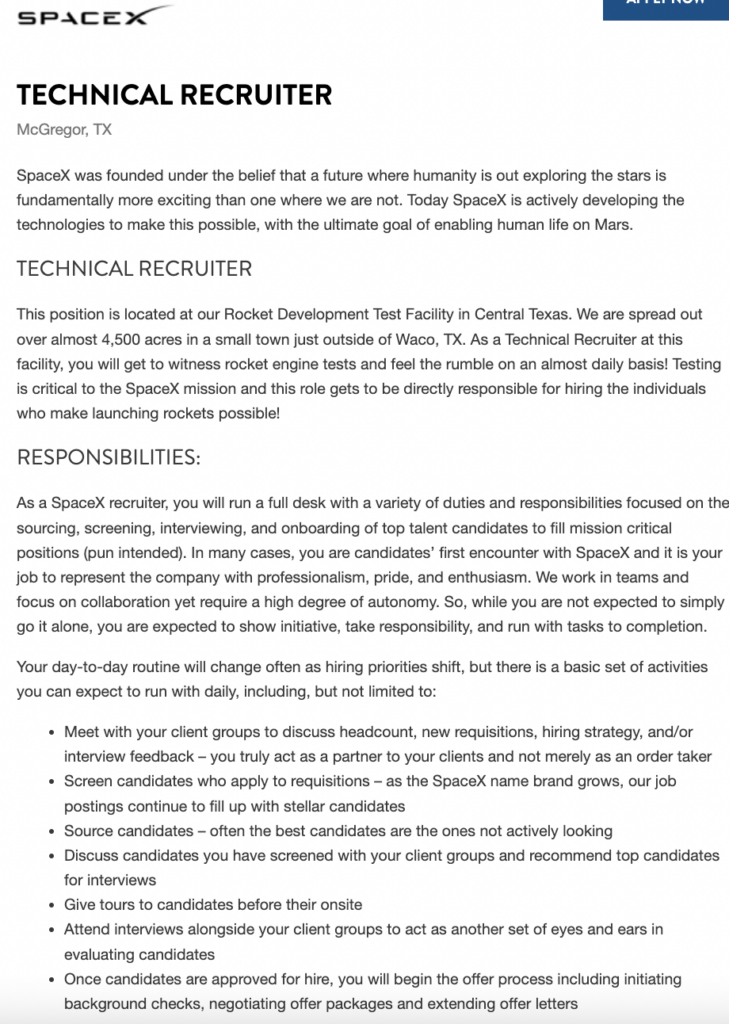
Example takeaways
Here’s what makes this a good job description:
- Strong introduction about SpaceX and its mission sets the context and excitement about the company goals.
- Clear outline of the position and responsibilities of the Technical Recruiter
- Provides a glimpse into SpaceX’s work environment, highlighting teamwork, autonomy, and the exciting nature of the work conducted at the Rocket Development Test Facility
- Details the comprehensive benefits package offered by SpaceX, providing transparency and potential incentives for applicants
2. Part-time Recruiter, Envision Horizons
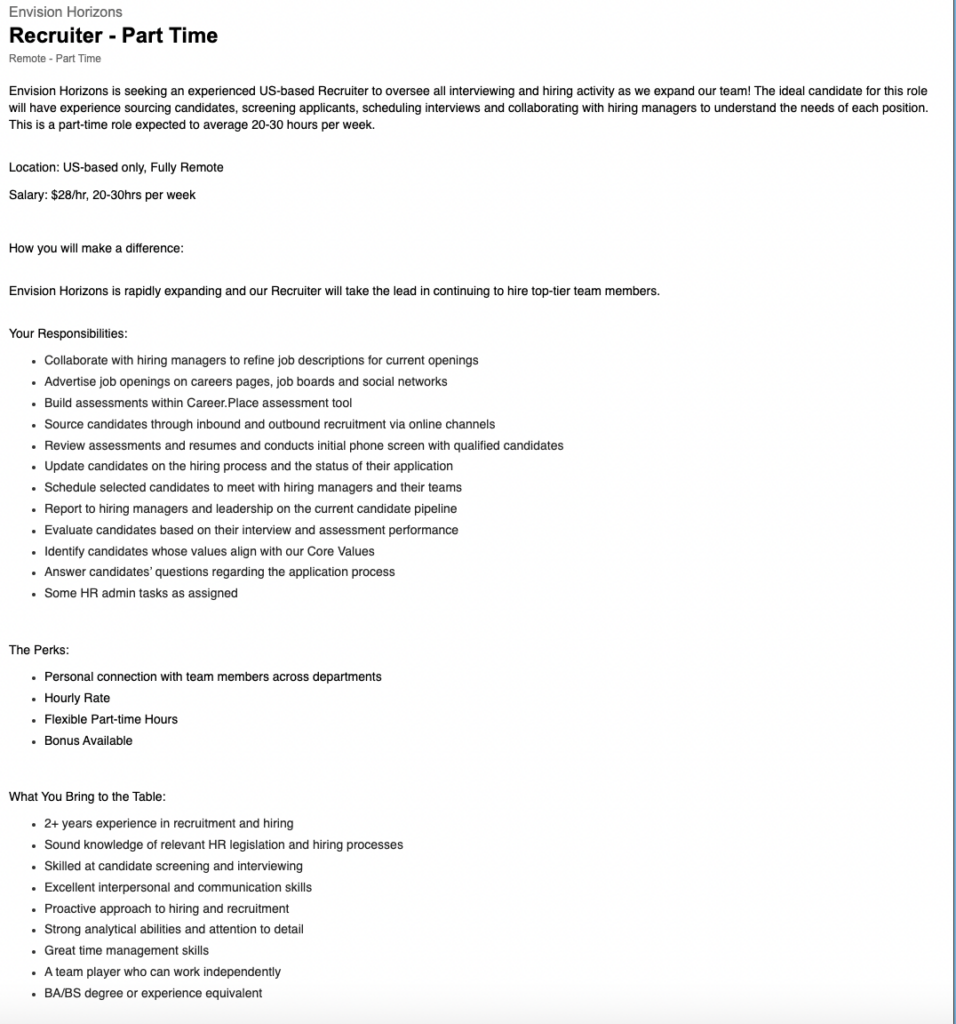
Example takeaways
While this recruiter job description example is generally informative, there are a few areas that could be improved:
- It could provide more specific details about the recruiter’s responsibilities. For example, it could include additional tasks such as conducting reference checks, coordinating background checks, and facilitating the offer process.
- Context about the company values and how they are integrated into the hiring process is missing.
- Highlight specific qualities important for success in the role, like strong problem-solving skills, adaptability to changing priorities, or experience working in a fast-paced environment.
- Lacking information about potential growth opportunities within the organization that would attract candidates interested in long-term career development
3. Recruiter, UPMC
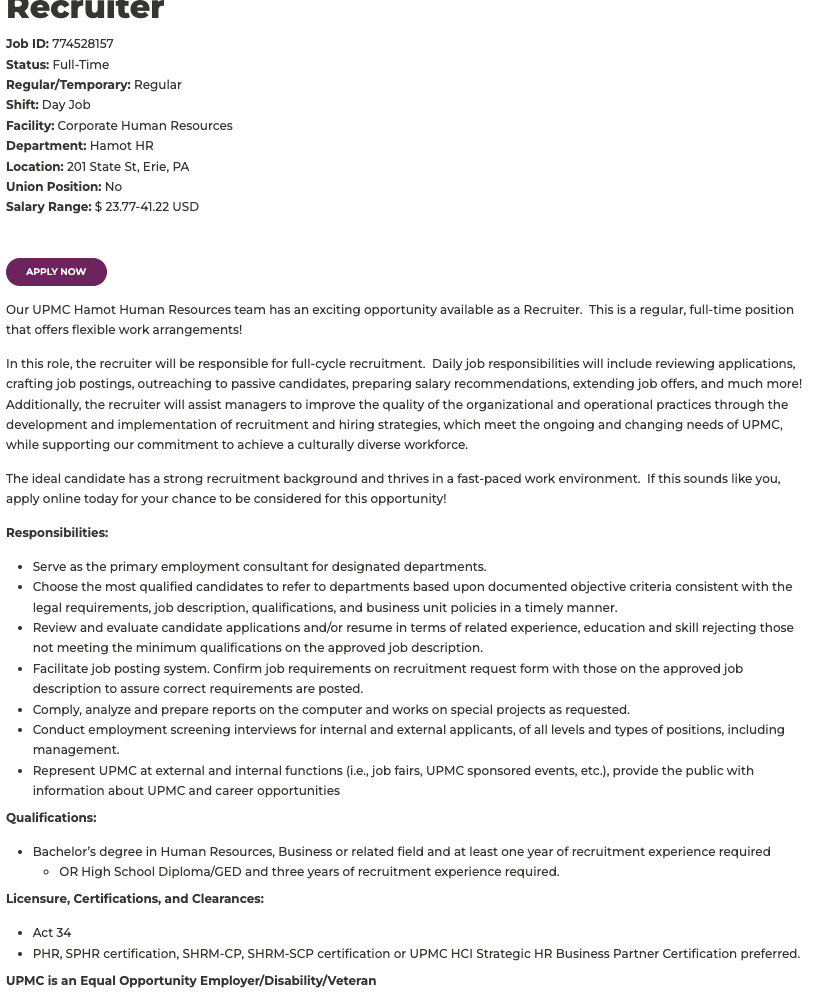
Example takeaways
Here are the reasons why this could be considered a good job description:
- Contains important information about the nature of the role by stating that the role is a regular, full-time position with flexible work arrangements
- Provides a thorough overview of the recruiter’s responsibilities, emphasizing the recruiter’s position in supporting organizational and operational practices through the development and implementation of recruitment and hiring strategies
- Specifies the educational requirements and recruitment experience needed for the role by mentioning preferred certifications
- Includes the Equal Opportunity Employer statement, promoting inclusivity and diversity within the organization.
Career prospects for recruiters
Recruiters play a crucial role in organizations by effectively attracting and recruiting the most suitable individuals. Their candidate selection process helps ensure that only the most qualified applicants are hired, which contributes to higher performance. Their employer branding knowledge helps create a good impression among job seekers. Recruiters who hire diverse candidates help foster a more inclusive work environment.
There are plenty of growth and development opportunities for aspiring recruiters. They can advance to senior-level positions that provide higher levels of responsibility. Some of the common HR career path:
- Senior Recruiter: Perform more complex recruiting activities
- Recruitment Manager: Manage a team of recruiters, oversee the entire hiring process, and ensures activities are aligned with organizational goals and hiring targets
- Talent Acquisition Manager: Lead the whole talent acquisition team, focus on employer branding, talent pipeline development, and diversity strategies.
- Head of Talent Acquisition, Head of Recruitment, or Vice President of HR: Leadership and executive positions that have a broader impact on talent management strategies, organizational development, and development of HR
Key learnings
- Writing a compelling recruiter job description is the first step towards attracting highly-qualified individuals who can drive your company’s success.
- Recruiters are tasked to source and select qualified candidates, achieve hiring targets, and contribute to the company’s overall talent acquisition strategy.
- To become a recruiter, an individual must have a bachelor’s degree in a relevant field, solid recruitment experience, and knowledge of recruitment best practices
- Recruiters can advance to more senior positions like Senior Recruiter, Recruitment Manager, Director of Talent Acquisition, and VP of HR.
Weekly update
Stay up-to-date with the latest news, trends, and resources in HR
Learn more
Related articles
Are you ready for the future of HR?
Learn modern and relevant HR skills, online





